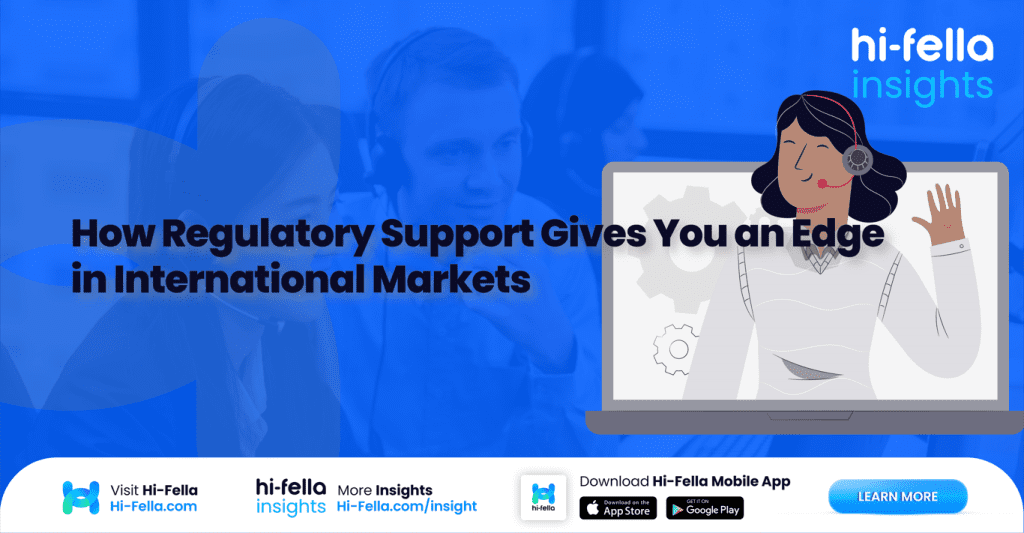In the global arena of trade, margins are tighter, competition is fiercer, and the velocity of disruption is faster than ever before. Businesses navigating international markets are no longer just battling price points or logistics—they are grappling with regulation as both a hurdle and a strategic opportunity. At its core, regulatory support isn’t just about staying compliant; it’s about staying competitive.
Whether you’re an exporter trying to break into the European Union or an importer managing duties from multiple origin points, understanding and leveraging regulatory support could be the very factor that separates market leaders from the rest.
Why Regulation Isn’t Just Red Tape Anymore
Historically, regulation has been viewed as a burden. Compliance requirements were often seen as a checklist activity—something that needs to be “handled” by legal or logistics teams. But in today’s trade environment, regulation touches everything: product design, partner selection, logistics choices, pricing, and even branding.
When done right, regulatory alignment becomes a strategic asset.
Take for instance the European Union’s CE marking system. For many exporters, achieving CE certification is time-consuming and complex. But once secured, it becomes a de facto quality assurance mark—granting access to 30+ countries and increasing customer confidence. Similarly, complying with REACH (Registration, Evaluation, Authorisation and Restriction of Chemicals) standards not only protects consumer safety but opens doors to major European buyers who won’t engage with non-compliant firms.
Regulatory support, when embedded into your market strategy, becomes a gateway to trust, speed, and sustainable scaling.
The Stakes Are Higher Than Ever
According to the World Trade Organization (WTO), non-tariff measures (NTMs) now affect around 90% of global goods trade. These NTMs—sanitary standards, product safety rules, licensing frameworks, labelling requirements—are often more impactful than tariffs themselves.
A report by UNCTAD revealed that technical barriers to trade (TBT) and sanitary/phytosanitary measures (SPS) are the most cited obstacles by developing country exporters. But here’s the twist: businesses with strong regulatory support structures are not only more likely to overcome these hurdles—they’re more likely to use them as a competitive wedge.
For instance, an Indonesian coffee exporter that is certified USDA Organic and EU Organic doesn’t just meet compliance; they can charge a premium, access luxury retail shelves, and secure contracts with global hotel chains. The regulatory hurdle becomes a marketing lever.
The Real Cost of Non-Compliance
Let’s be clear: the absence of regulatory support can be a business killer. In a 2022 survey by Thomson Reuters, 56% of global trade professionals said they had lost revenue due to regulatory issues, while 34% had to scrap entire market entry plans.
Common pitfalls include:
- Misclassification of HS codes leading to excessive tariffs or delays
- Shipping restricted items without proper licenses
- Labeling errors triggering rejection at customs
- Lack of product certifications causing contract terminations
- Overlooking export controls and sanctions resulting in fines
Fines can be eye-watering. In 2020, a US semiconductor company paid over $34 million for violating export control laws. But more subtle losses like shipment delays, inventory spoilage, or broken buyer trust can be even more devastating in the long run.
What “Regulatory Support” Actually Means
Regulatory support isn’t a single solution—it’s a layered infrastructure that makes your trade operations more intelligent, adaptive, and compliant. It includes:
- Regulatory Intelligence
Knowing which rules apply to your products, markets, and partners. This isn’t static. It involves constant monitoring of trade laws, certifications, quotas, and bilateral agreements. - Process Guidance
Understanding the exact steps required to secure licenses, submit declarations, or complete inspections. Many businesses fail not because of lack of intent but because of lack of know-how. - Documentation Support
Most compliance failures are tied to poor documentation. Regulatory support includes templates, verification systems, and real-time checks on customs paperwork, invoices, and certifications. - Partner Verification
Working with suppliers or buyers that are non-compliant can create liability. Advanced regulatory platforms help verify partners across denied party lists, sanction databases, and export control compliance. - Digital Infrastructure
As more governments adopt digital trade platforms—like Singapore’s Networked Trade Platform (NTP) or the EU’s TRACES NT—regulatory support also includes digital readiness. Having the right tech stack matters as much as having the right paperwork.
Hi-Fella’s Role in Regulatory Enablement
Hi-Fella isn’t just another B2B platform. It positions itself as a regulatory ally to exporters and importers who want to play the global game without getting burned by complexity.
Here’s how it supports traders in real-time:
- Regulatory Lookup Engine
Based on your product, country of origin, and target market, Hi-Fella delivers tailored compliance requirements, including required licenses, inspection regimes, and certification options. No more navigating through hundreds of PDF documents on government portals. - HS Code-Based Compliance Mapping
The system cross-verifies your product description with likely HS codes and flags any potential red tape—such as whether your item is on a restricted list or if it triggers dual-use controls. - Document Templates and Automated Workflows
Whether you’re filing for a phytosanitary certificate or a Certificate of Origin, Hi-Fella provides fillable templates validated by global trade experts. For recurring shipments, workflows can be automated—saving hours of back-and-forth with logistics agents and customs brokers. - Sanctions and Watchlist Integration
With real-time alerts tied to global sanctions lists (e.g., OFAC, UN, EU), Hi-Fella helps you avoid doing business with flagged entities—a critical safeguard in today’s geopolitical climate. - Guided Market Entry Planning
Thinking of entering Saudi Arabia with packaged food products? Hi-Fella guides you through SFDA registration, Arabic labeling laws, halal certification requirements, and even connects you with verified agents who’ve passed local audits.
Building a Regulatory-First Trade Culture
Forward-thinking companies don’t treat regulatory support as an afterthought. They weave it into their operations and culture. This includes:
- Training procurement teams on how to validate vendor compliance
- Involving compliance officers during deal structuring
- Using software (like Hi-Fella) to screen new buyers and reduce KYC risk
- Treating regulatory requirements as branding assets rather than burdens
There’s also growing alignment between regulation and ESG (Environmental, Social, and Governance) priorities. Being compliant with international labor laws, carbon reporting standards, or sustainable packaging mandates isn’t just a regulatory checkbox—it’s now a requirement for gaining access to global buyers with high ESG standards.
Future-Proofing Through Compliance
Regulation isn’t going away. In fact, the future of trade will be defined by how well businesses can comply and how fast they can adapt to evolving rules.
Here’s what’s coming:
- Greater enforcement of carbon border taxes (starting in the EU with CBAM)
- Rising digital compliance via e-customs and blockchain-based trade documents
- More scrutiny on AI, cybersecurity, and data-related exports
- Mandatory ESG disclosures for multinational suppliers
Those with strong regulatory support will not only be ready—they’ll thrive.
Trade used to be about who could move goods faster. Today, it’s about who can move goods smarter. And regulatory support is at the heart of that shift.
With Hi-Fella’s end-to-end compliance intelligence, document automation, and real-time risk management, exporters and importers no longer need to fear regulation. They can use it to outmanoeuvre competitors, build trust with global buyers, and unlock high-value markets that others can’t reach.
In a fragmented world of trade, compliance is the new credibility—and with the right support, it becomes your edge.
Let your rivals scramble through paperwork. You? You’ll be closing deals with confidence.
Join Hi-Fella Today!
In the competitive world of international trade, staying compliant isn’t just about avoiding penalties — it’s a strategic advantage. With Hi-Fella’s robust regulatory support, export-import businesses gain the clarity and confidence needed to enter new markets, close deals faster, and build lasting partnerships with trust.
From up-to-date compliance insights to a network of verified, regulation-ready suppliers and buyers, Hi-Fella equips you with the tools to trade smarter and safer. If you’re looking to gain a true edge in global markets, let Hi-Fella be your trusted partner in navigating the regulatory landscape with ease and precision.








